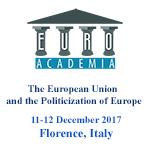Euroacademia Conferences
 Europe Inside-Out: Europe and Europeanness Exposed to Plural Observers (9th Edition) April 24 - 25, 2020
Europe Inside-Out: Europe and Europeanness Exposed to Plural Observers (9th Edition) April 24 - 25, 2020 Identities and Identifications: Politicized Uses of Collective Identities (9th Edition) June 12 - 13, 2020
Identities and Identifications: Politicized Uses of Collective Identities (9th Edition) June 12 - 13, 2020 8th Forum of Critical Studies: Asking Big Questions Again January 24 - 25, 2020
8th Forum of Critical Studies: Asking Big Questions Again January 24 - 25, 2020 Re-Inventing Eastern Europe (7th Edition) December 13 - 14, 2019
Re-Inventing Eastern Europe (7th Edition) December 13 - 14, 2019 The European Union and the Politicization of Europe (8th Edition) October 25 - 26, 2019
The European Union and the Politicization of Europe (8th Edition) October 25 - 26, 2019 Identities and Identifications: Politicized Uses of Collective Identities (8th Edition) June 28 - 29, 2019
Identities and Identifications: Politicized Uses of Collective Identities (8th Edition) June 28 - 29, 2019 The European Union and the Politicization of Europe (7th Edition) January 25 - 26, 2019
The European Union and the Politicization of Europe (7th Edition) January 25 - 26, 2019 7th Forum of Critical Studies: Asking Big Questions Again November 23 - 24, 2018
7th Forum of Critical Studies: Asking Big Questions Again November 23 - 24, 2018 Europe Inside-Out: Europe and Europeanness Exposed to Plural Observers (8th Edition) September 28 - 30, 2018
Europe Inside-Out: Europe and Europeanness Exposed to Plural Observers (8th Edition) September 28 - 30, 2018 Identities and Identifications: Politicized Uses of Collective Identities (7th Edition) June 14 - 15, 2018
Identities and Identifications: Politicized Uses of Collective Identities (7th Edition) June 14 - 15, 2018
The Nostalgia of the Empire: Neo-Ottomanism, Euro-skepticism and Desecularized Nationalism in Contemporary Turkey
-
-

-
Presentation speakers
- Martin Noel, Ecole des Hautes etudes en Sciences Sociales, Paris / Institut Catholique de Paris
Abstract:
Working on populism does not come without contradiction. If many rightly point out that it is more of an “empty signifier” than an analytical concept, it has mainly been described as a rhetorical style based on the dichotomic construction of an “us” and a “they”. What does this mean when we are not actually talking about persons or movements but regimes? Acknowledging the relative idiosyncratic nature of every populist utterance, I would like to argue that right wing populism, more narrowly defined as “ethno-cultural populism” can and should be understood as a resurging mode of governance. The case of Turkey and its ruling party, the AKP, is in this perspective enlightening. All too often reduced to a “shift from pluralism to Islamic populism” , the recent events in the country testify less of a shift, than of the reframing of a long tradition of negation and containment of social antagonisms. From the founding of the Republic onwards the very definition of the nation on ethno-cultural and religious bases, has been used to suppress dissent, as much as the use of a emergency discourse targeting Europe or “the West”. I would therefore argue in this paper, that the rise of a strong euro-skeptical, nationalist-islamic discourse among the new elite is therefore but the adaptation of old governmentality devices in the wake of rising socio-economic inequalities and pauperization and a resurging war with the Kurdish minority.
-
Related Presentations

The Possibility of Philosophy of Nationality through Bertrando Spaventa’s Thought and its Alternative
- Sevgi Doğan

The Cacophonic Concert of Europe: Between Nationalism and Grand Strategy
- Wolfgang Danspeckgruber
- Uriel Abulof

On Being European
- Ihsan Baris Gedizlioglu













